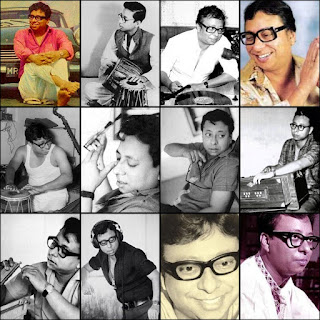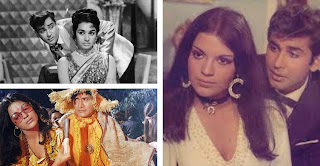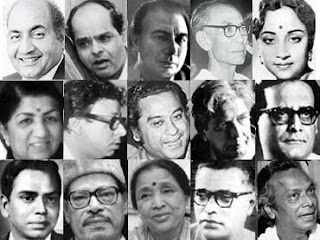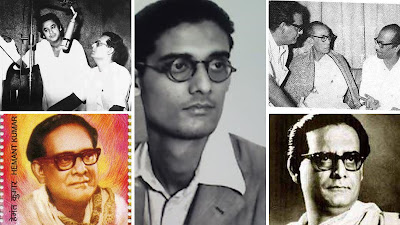PART 9 OF 10: YEH KYA HUA? KAISE HUA?
I am going to finish off this series with two lovely songs from Rahul Dev Burman or RD Burman or RDB; the shining star of the seventies, the scion of the Burmans, inheritor of musical riches, the original Rock Star of Indian music...Call him all the names you like.
Pancham - another of his names that stuck to him from childhood, apparently because he cried precisely in the fifth note (Pa) or because he wept in five notes - was born with the proverbial silver spoon (and audava raga swarams, if you get my drift) in his mouth. That is often, reason enough to bog one down for a lifetime of entitlement and perpetual submediocrity. People born to overachieving parents either lack the talent or the drive to bear the weight of public expectations. Or both. (Cough...Abhi...cough..shek..cough...Bach...cough...chan). Pancham not only rose against the onerous gravity of being SD Burman's son but went a step further and established himself as the undisputed trendsetter of Indian film music. If Karan Johar ever needed a potent defense against Kangana Ranaut for the positive effects of nepotism, he should have looked no further than Pancham.
For all his so-called pedigree, success was not handed out to him overnight. It took a major amount of hustling for close to a decade in order for him to make it big. And when he did, he irreversibly changed the popular musical landscape of India from the grandly orchestrated, classically based fare of the fifties and sixties, to the peppy, rhythm- and chords-based pop music of the seventies.
RDB debuted as an independent composer in the 1961 Mehmood-starrer, 'Chhote Nawab', and scored a smattering of hits in the early years. It was in the early seventies, however, with the advent of the hippie culture that he really got into his groove. But it is unfair to slot him in a hole as just a giver of hippie music. RDB was prodigiously versatile and a musical chameleon - his evergreen hits with Rajesh Khanna and Kishore in movies like 'Kati Patang', 'Amar Prem', and 'Mere Jeevan Saathi' (the trio were thick as thieves and collaborated in forty-two films) introduced music lovers to a new, Jazzy repertoire still rooted in Indianness; the swashbuckling foot-tappers in movies like 'Teesri Manzil', 'Hare Rama Hare Krishna', and 'Yaadon ki Baaraat' made him the indubitable Rock Star of Young India; and then there were the deep and evocative ghazals of 'Aandhi', 'Parichay', and 'Masoom' which tugged at your heart strings.
The other great thing about Pancham was how reassured he was, as a musician. Bombay was swarming with musical talent then. He tapped into all of that goodness and yet allowed each of those talents to flourish individually. The likes of Manohari Singh (his main arranger and saxophone, bansuri, and clarinet player), Maruti Rao (arranger and tabla and tumba player), Amrut Katkar (tabla, reso reso), Homi Mullan (poly-percussionist), Bhanu Gupta (guitar), and Tony Vaz (bass guitar), to name a few, came together to form the venerable 'Navaratna' of RDB's orchestra. Half a dozen of them would become composers in their own right in future years.
By the time he passed away, rather prematurely, aged 54, Pancham had scored music for three hundred and thirty films and had captured the imagination of Indians all over for over two decades. There was the flip side and the laments too. In the eighties, the film industry shunned him as he had a series of flops. His ardent fans also point to the underwhelming recognition from the music establishment (no National Awards, two Filmfare awards in thirty years despite fifteen nominations, no Padma Shri, Padma Bhushan, et al). But then, Pancham had the last laugh. His "requiem" was the brilliant, '1942: A Love Story', which won him his third Filmfare award, posthumously. RDB's stockpile of chartbusting music has found new waves of fans in every generation since his peak years, including movies made with the sole purpose of celebrating his music. I am not sure if any of his predecessors (including his father) or his contemporaries can claim that kind of a lasting impact.
When it comes to Pancham's ingenuity, it doesn't get better than 'Amar Prem' (1972), a patchily directed film by the celebrated Shakti Samanta, saved entirely by RDB's haunting music. Almost every song in it is a gem and a featured favorite on someone’s playlist. There is another of Lata's classics, 'Raina beet jaaye' which could have absolutely made it to this list, but we have had enough of Lata already. 'Amar Prem' also has two of Kishoreda's greatest solos: 'Chingari koi bhadke' and 'Kuchh to log kahenge'. There is no doubt that SD Burman was the father-figure for Kishoreda and gave him the biggest break in his singing career with 'Aradhana', but it was RDB that ushered Kishore into glory, giving him some of his best solos and duets, whether it was in 'Amar Prem', 'Kati Patang', 'Ajnabee', 'Aandhi', or from the innumerable other movies that the two have collaborated in. Pancham widened Kishoreda's repertoire and shone a light on his ability to sing ghazals with the same élan as he yodeled to 'Nakhre wali' or frivoled away to 'Haal kaisa hai janaab ka'.
Kishoreda became such a dominant force after 'Aradhana' that it is rumored that Mohd Rafi went into depression and vowed never to sing again. RDB himself was instrumental in Rafi's comeback of sorts in 'Hum Kisi Se Kum Nahin' (1977), which won him a national award for 'Kya hua tera wada'.
Since we are talking about RDB and Kishoreda, I would be seriously remiss if I don't mention another name in the same breath, and close out the holy triumvirate of the seventies. Rajesh Khanna. The man that is touted as the first Superstar of India. Fans of yesteryear superstars such as Dilip Kumar, Dev Anand, MGR, NTR, or Uttam Kumar would balk at such a characterization. But no one can deny that he was the first hero to have a frenzied female fan-following that wrote letters to him in blood. The young men from that era never excused him for walking away with the heartthrob of the generation, Dimple ‘Bobby’ Kapadia. Ace filmmakers such as Shakti Samanta and Hrishikesh Mukherjee swore by him as their best bet. Naseeruddin Shah, on the other hand, called him a 'poor actor'; and my aunt dismissed him as the 'side-walking Gorkha'. Such was Khanna's draw that elicited these extreme reactions from people. All that said, his star power and his box office draw was indisputable. The numbers spoke for themselves. Between 1969 and 1972, Khanna had fifteen consecutive hits - a record that the Superstar of the millennium, Amitabh Bachchan, or the indomitable Rajnikanth could claim.
Back to 'Amar Prem', I will go with this seemingly light-hearted, but melancholic favorite of mine from Kishore, 'Yeh kya hua, kaise hua'. How effortlessly beautiful this number is! I have this theory that the songs of RDB are evergreen because they are simple. That doesn't take one bit away from the richness of his songs or his musical adeptness. In fact, it is the opposite. It is tougher to take the raagas and rhythms, the nuances of strings and harmonies, and the orchestrations, and distill it all to give it in a form that is palatable to a wide range of ears. RDB's music that way was truly multi-layered. One can enjoy the core melody because it is so "hummable", but also depending on one's expertise and tastes, it allowed for one to appreciate layers of music hidden inside. That is the hallmark of a genius.
So here you go with 'Yeh kya hua, kaise hua' with lyrics by Anand Bakshi.











Comments
Post a Comment